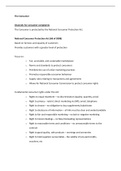Summary
Summary Grade 12 The Consumer Chapter Consumer Studies Notes IEB Final exam
- Course
- Institution
This document contains information regarding the Grade 12 Consumer Studies The Consumer Chapter, which have been written meticulously according to the updated IEB SAGs for Consumer Studies for 2022/2023 etc. These summaries include channels for consumer complaints in the food, textile and housing i...
[Show more]



